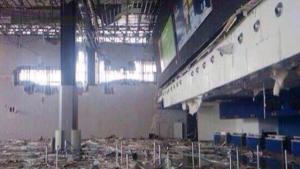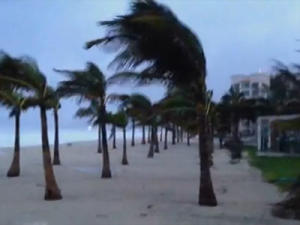 Yahoo News – by Alba Mora Roca
Yahoo News – by Alba Mora Roca
Mexico (AP) — The Mexican government began airlifting the first of tens of thousands of stranded tourists out of the hurricane-ravaged resort area of Los Cabos on Tuesday, as residents picked up the pieces of shattered, flooded homes.
The Interior Ministry said military and commercial planes were carrying travelers out through the Los Cabos international airport, which remained closed to commercial flights due to damage suffered when Hurricane Odile tore through the area late Sunday and Monday.
Travelers were being flown free of charge to airports in Tijuana, Mazatlan, Guadalajara and Mexico City to catch connecting flights and, in the case of foreigners, receive consular assistance.
Fatai Oshi-Ojuri, a tourist from Oakland, California, was among the first to get out on a Federal Police jet. He said the airport in Los Cabos was a mess: roof panels and electrical wiring down, signs and windows shattered, and the terminal full of water.
“That was like a scene from ‘The Walking Dead,'” he said by phone from Mazatlan, where he was waiting for an Alaska Airlines flight to Los Angeles.
Oshi-Ojuri had come to Mexico with his girlfriend for a long weekend to celebrate his 30th birthday when Hurricane Odile roared onshore and cut their vacation short.
“It’s been an interesting experience to say the least,” he said.
Officials estimated it would take two days to ferry out the 30,000 tourists who were being put up in temporary refuges or hotel areas converted to shelters. Some 26,000 of those were foreigners, primarily from the United States, Canada and Great Britain.
Thousands in the state of Baja California Sur remained without electricity, water or phone service. A boat was on its way with humanitarian aid, and authorities were working to restore utilities.
President Enrique Pena Nieto was scheduled to tour the area later, after presiding over an independence day military parade in the capital.
Downgraded to a tropical storm, Odile began moving into the Gulf of California and was expected to reach the U.S. state of Arizona Wednesday evening as a tropical depression. Forecasters said it was still capable of unleashing dangerous flash floods and mudslides.
In Los Cabos, Enrique Cota wept as he stood in murky, ankle-deep water and surveyed the destruction at his home. On the kitchen wall, a muddy mark nearly waist-high showed how deep the floodwaters got.
“We’ll have to start over, little by little,” Cota said, “because the stove, the refrigerator, the television, the kid’s computer — it’s all ruined.”
He rode out Odile’s landfall in a shelter with firefighters, and said he hadn’t slept for two days.
Homes, stores and resorts along Los Cabos’ famed hotel row all suffered severe damage, with room windows shattered, facades crumbled and lobbies full of debris.
Emergency officials in Baja California reported that 135 people were treated for minor injuries from flying glass or falling objects.
But surprisingly for a hurricane of this intensity — it made landfall as a monster Category 3 storm — there were no reports so far of fatalities directly related to Odile.
The U.S. National Hurricane Center said that by Tuesday evening Tropical Storm Odile had maximum sustained winds near 50 mph (85 kph). It was centered about 130 miles (210 kilometers) south of Puerto Penasco, and was moving to the north near 7 mph (11 kph).
Farther south in the Pacific, Tropical Storm Polo formed off southern Mexico Tuesday evening. It was centered 245 miles (400 kilometers) south-southwest of Acapulco with maximum sustained winds of 45 mph (75 kph), and was moving northwest parallel to the coast at 12 mph (19 kph). The hurricane center predicted that Polo could become a hurricane later in the week.
Meanwhile in the central Atlantic, Hurricane Edouard was a Category 2 storm with maximum sustained winds near 105 mph (165 kph). It was forecast to pose no threat to land.
___
Associated Press writers Maria Verza and Peter Orsi contributed from Mexico City.
http://news.yahoo.com/weakening-odile-pushes-mexicos-baja-california-040829835.html



